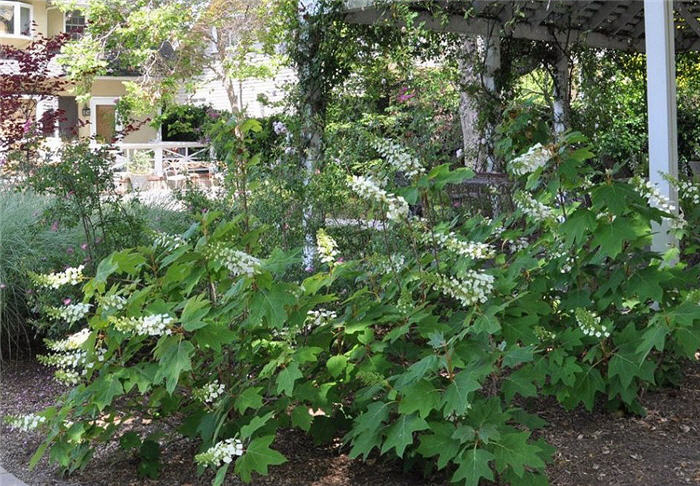| Botanical Name: Hydrangea quercifolia | |
| Common Name: Oakleaf Hydrangea |

-
Anatomy
-
Culture
-
Design
Plant Type
Shrub
Height Range
6-12'
Flower Color
White
Flower Season
Summer
Leaf Color
Green
Bark Color
Brown
Fruit Color
n/a
Fruit Season
n/a
Sun
Half, Shade
Water
Low, Medium
Growth Rate
Moderate, Slow
Soil Type
Clay, Loam
Soil Condition
Average, Rich, Well-drained, Dry
Soil pH
Acid, Neutral, Basic
Adverse Factors
n/a
Design Styles
English Cottage, Formal, Mediterranean, Ranch, Spanish, Woodland
Accenting Features
Fall Color, Showy Flowers, Unusual Foliage
Seasonal Interest
Winter, Spring, Summer, Fall
Location Uses
Background, Perennial Border, Shrub Border, Foundation, Patio, Walls / Fences
Special Uses
Cut Flowers, Hedge, Screen, Small Spaces
Attracts Wildlife
n/a
Information by: Stephanie Duer
Photographer:
Photographer:
-
Description
-
Notes
Oakleak hydrangea is a deciduous, summer blooming shrub with an irregular, rounded habit growing about 6 to 8 feet tall and wide. Green leaves are large and deeply lobed, and reminiscent of oak leaves; fall color is a rich burgundy. White flower clusters appear in mid summer in erect, terminal panicles; flowers slowly age to a pinkish-purple color and persist into the fall. Mature stems exfoliate to reveal a rich brown inner bark which is attractive in winter. Fabulous in the shady shrub or foundation border. Excellent cut flower. Many selections available.
Grow in well-drained, loamy soil in part to full, filtered shade. Adaptive to soil type and pH. Water need depends in part on soil and exposure, but given a well-drained loamy soil in filtered light, watering needs are regular, though periodic. Because it blooms on its old wood, the plant should not be pruned until after flowering. Oakleaf hydrangea is very cold hardy and doesn't die-back like H. arborescens 'Annabelle.'